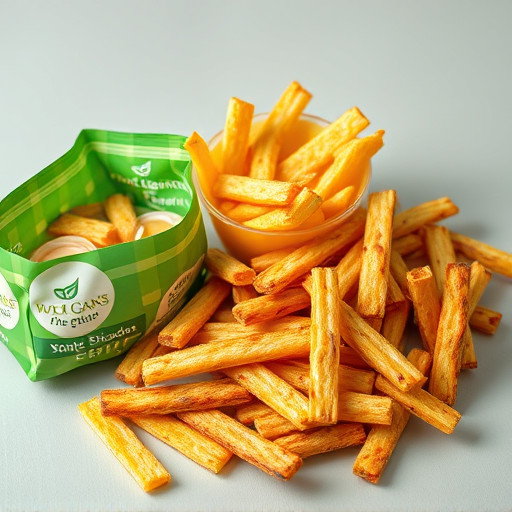Snacks impact our health and diet. Choosing healthy options like fruits, vegetables, whole grains, lean proteins, and healthy fats provides sustained energy and essential nutrients, regulating hunger and promoting better dietary choices. Highly processed snacks high in added sugars and unhealthy fats cause blood sugar spikes and crashes, leading to increased cravings for unhealthy food. Mindful snacking involves balance, portion control (using smaller plates, measuring serving sizes), mindful eating, and combining snacks with regular exercise for guilt-free treats.
Snacks play a significant role in our daily diets and overall health. This article explores the nutritional value of snacks and their impact on our well-being, delving into both positive and negative effects. We will guide readers through strategies for balancing snack habits, focusing on portion control and making healthier choices to foster nutritious lifestyles. By understanding the implications of common snack selections, individuals can make informed decisions that contribute to a balanced diet.
- The Role of Snacks in Our Diet: Examining Their Nutritional Value
- Health Implications: Positive and Negative Effects of Common Snack Choices
- Balancing Snacking: Strategies for Healthy Habits and Portion Control
The Role of Snacks in Our Diet: Examining Their Nutritional Value

Snacks play a significant role in our daily diets and can greatly impact our overall health. While they are often associated with convenience and immediate satisfaction, carefully chosen snacks can contribute to balanced nutrition. The nutritional value of snacks varies widely depending on their ingredients; some offer essential vitamins, minerals, and fiber, while others may be high in added sugars, unhealthy fats, and empty calories.
Incorporating nutrient-dense snacks into our routines can help regulate hunger between meals, support energy levels, and promote better dietary choices later. Fruits, vegetables, whole grains, lean proteins, and healthy fats are excellent options that provide sustained energy and essential nutrients. On the other hand, processed snacks high in sugar and unhealthy fats can lead to blood sugar spikes and crashes, leaving us feeling less satisfied and potentially increasing cravings for more unhealthy food options.
Health Implications: Positive and Negative Effects of Common Snack Choices

Snacks play a significant role in our daily diets and can have both positive and negative effects on our health. On the plus side, choosing nutritious snacks like fruits, nuts, yogurt, or whole-grain crackers can help maintain energy levels, support brain function, and even promote better heart health by providing essential vitamins, minerals, and fiber. These options can also aid in weight management as they tend to be more filling and less processed than their high-sugar or high-fat alternatives.
However, the negative implications of common snack choices cannot be overlooked. Highly processed snacks often contain excessive amounts of added sugars, unhealthy fats, and artificial additives, which can contribute to obesity, type 2 diabetes, and cardiovascular disease. Furthermore, such snacks may provide little to no nutritional benefit, leading to energy crashes and increased hunger later. Therefore, being mindful of the types of snacks we choose is crucial for maintaining overall health and well-being.
Balancing Snacking: Strategies for Healthy Habits and Portion Control

Snacking is an integral part of our daily lives, but balancing it with healthy habits requires a mindful approach. Portion control is key; overeating, even nutritious snacks, can lead to excess calorie intake. Strategies for managing portions include using smaller plates and bowls, measuring serving sizes, and practicing mindful eating by paying attention to hunger cues and fullness signals from your body.
Combining physical activity with snacking habits can also contribute to overall health. Incorporating regular exercise allows you to enjoy treats without guilt, as it helps burn off excess calories. Additionally, active lifestyles reduce cravings for unhealthy snacks in the first place. So, finding a healthy balance involves a combination of mindful eating, portion awareness, and an active lifestyle.
Snacks play a significant role in our diets and can have both positive and negative impacts on health. By understanding their nutritional value and adopting balanced snacking habits with appropriate portion control, we can make informed choices that support overall well-being. Remember that the key lies in moderation and selecting nutritious options to fuel our bodies between meals.


